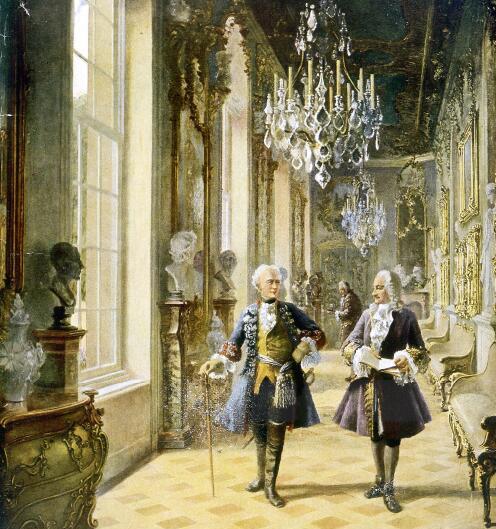Wen | Feng Lu

Frederick the Great and Voltaire in a Sanssouci Palace, Georges Schubert, oil on canvas
Unlike Rousseau, who explicitly demanded equality from the beginning, Voltaire spared no effort in pointing out problems, but when it came to solving problems, he appeared passive and conservative. In his novels, the protagonist, who represents the righteous side, is always powerless in the face of bullying, comforting himself: "The wicked are distressed after all, and their role is only to temper a few decent gentlemen in the world, and it is necessary to know that good and evil live together, and there is no evil that does not produce a little good result." "It is in keeping with the enlightened monarchy he has always advocated—that an overbearing monarch is bad, but it is even less desirable to overthrow it through violent revolution. But it was clear that Louis XV did not meet his expectations of an "enlightened monarch": leaving aside the king's love affairs, which were cited as talking points, Louis XV himself lacked both military talent and few means of governing the country, and France's european hegemony at this time was already in jeopardy.
In 1733, France intervened in the Polish succession war in favor of Louis XV's father-in-law Stanislas. Although unsuccessful, Stanislas was compensated by the Principality of Lorraine and declared that after his death, he would transfer the Lorraine region, which was mostly French residents, to France, which was no less than a blow to Austria, France's sworn enemy. But no one expected that this would be France's last territorial gain before the Revolution.
Voltaire's House in Fernai
At the end of 1740, King Frederick II of Prussia invaded Silesia and the War of the Austrian Succession broke out. Louis XV, credulously believed in the encouragement of his mistress, the Marquise de Vendimil, believing that the newly enthroned Queen of Austria, Maria Teresa, was too young to be afraid, and that it was a good time to dismember Austria and order count Belle Isler to attack Prague. Only a year later, Frederick II turned his back on France and reached a secret agreement with Austria, leaving Count Isler's 20,000 troops surrounded in Prague, and only 2,000 men managed to break through.
However, only 4 years after this humiliating defeat, Louis XV was once again overwhelmed by the sweet words of his mistress and re-signed a covenant with Frederick II. This time, Louis XV even went into battle himself, taking his mistress and his mistress's luxuries with him, and it was not long before he fell ill from heat and fatigue, and was once critically ill. When the news of the king's recovery under the queen's care reached Paris, people took to the streets to celebrate him, affectionately calling him "our beloved Louis", and the whole of France rejoiced at his recovery and repentance, only the king himself did not know: "What have I done for them, made them love me so much?" Of course, France still did not bargain this time, and according to the treaty of Aachen II (1748) signed after the war, France was forced to recognize the legitimacy of the Hanoverian dynasty and return the southern Netherlands to Austria.
His own king was unreliable, and Voltaire turned his hopes to his admirer Frederick II. The young monarch had read a great deal of Voltaire's works since his youth, and while he was still a prince, he corresponded with the reclusive Voltaire, "Your kindness and assistance to those aspiring art and scientific workers, I hope that you will not exclude me from the students you consider to be able to be made..." Although during the War of the Austrian Succession, Voltaire repeatedly tried to persuade Frederick II to ally with France as a peace envoy, which disgusted the king, But he still paid tribute to the wise man, and in 1750 invited Voltaire to Berlin with the position of imperial chancellor, free accommodation and 20,000 livres.
Voltaire and the Farmer of Fernay, 1770, Jean Hubert, oil on canvas, now in the Musée d'Arte de Nantes, France
Even Voltaire himself was satisfied with the king's reception: the splendid rooms of the Sanssouci Palace, the king's horses, coachmen, cooks at his behest, and the princes and nobles and even the queen herself came to visit him personally. "I get here a fate of eternal tranquility. If there is anything in the world that is true, it is the personality of the King of Prussia. Voltaire said in a letter to his girlfriend, Madame Denis.
This tranquility lasted only a few months before the contradictions were exposed: Voltaire was desperate to make his king and student an ideal "enlightened monarch"—benevolent, generous, and peace-loving—while the ambitious Frederick II saw him only as a down-and-out scholar who was fostered in the palace to show his broad-mindedness. Soon, Voltaire discovered that what he thought of as "Athens of the North" was nothing more than a cold Spartan with a lot of military might, and the king himself was treacherous and often unscrupulous to achieve his goals. In the ensuing controversy with Moperti, the king sided with Moperti and even sent a message to Voltaire: "I will keep him (Voltaire) for another year at most (to correct my French). People always throw away the peel after squeezing oranges. Terrified, Voltaire had to flee again. At the mediation of Madame de Pompadour, in 1758 Louis XV finally reluctantly agreed to the return of this "terrible pagan" to France on the condition that he was not allowed to approach Paris. Voltaire settled in Ferney, and a historic friendship ended hastily.